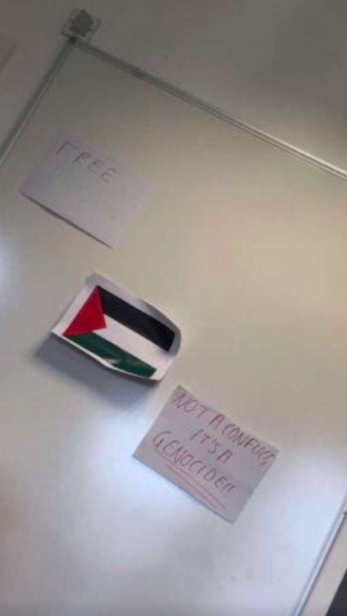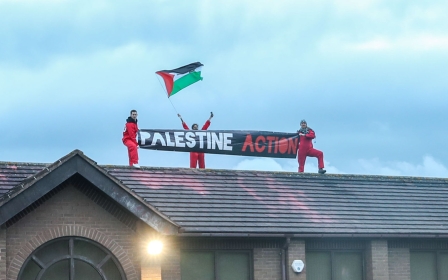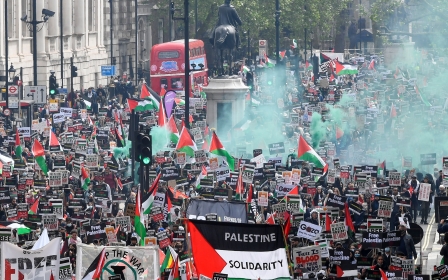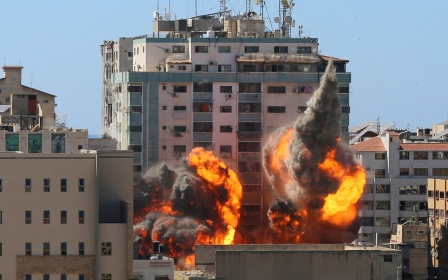British schoolchildren face punishment for wearing Palestine flags and keffiyehs
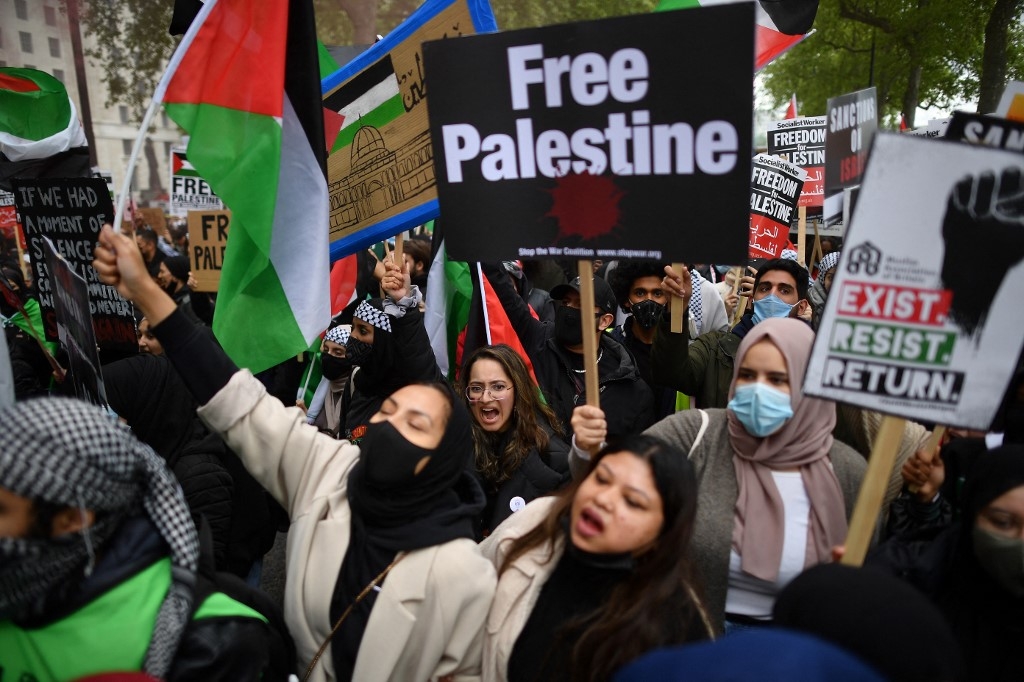
Schoolchildren in the UK are being punished for their pro-Palestine activism on school premises, with some being disciplined for wearing keffiyehs and holding Palestine flags.
Several students who spoke to Middle East Eye said they were threatened with detention, expulsion and being blocked from taking their exams if they continued protesting for Palestinian rights on school premises.
The forms of activism being penalised by schools include displaying the Palestinian flag on face masks or their hands and putting up posters designed by students to educate their peers on the Israel-Palestinian issue.
Every student and teacher who spoke to MEE requested anonymity as they feared possible repercussions from their school for speaking out.
New MEE newsletter: Jerusalem Dispatch
Sign up to get the latest insights and analysis on Israel-Palestine, alongside Turkey Unpacked and other MEE newsletters
Pupils who spoke to MEE attended schools in Birmingham, Leeds, Manchester, Rochdale and different areas of London.
Jay, a student from Allerton Grange School in Leeds, said she was motivated to put up posters after attending demonstrations and reading stories about child deaths in Gaza.
Taking inspiration from last year's Black Lives Matter protests (BLM) and her school's awareness campaigns on LGBT rights and mental health, Jay assumed Allerton George would encourage discussion on Palestine.
But when students put up posters around the school in communal areas without permission, teachers quickly took them down.
"The teachers went as far as ripping the Palestine posters into pieces and scrunching them up in our faces," Jay told MEE.
"When we asked why they took down the posters, the teachers said they didn't have to justify it to us and were given clear instructions to take down these posters as they were seen as sending antisemitic messages."
Jay stressed the messages on the posters were not antisemitic and said: "End Israeli Apartheid, End illegal Occupation and Free Palestine".
She added: "They took our lanyards from us because they had the Palestine flag.
"When we asked them why it was okay to wear BLM or LGBTQ+ flags on our lanyards but not Palestine, they couldn't give us an answer and later said as a political cause, it caused distress to others.”
Students from Allerton Grange later posted a video of headteacher Mike Roper describing the Palestinian flag as a "call to arms" and "symbol of antisemitism". Roper has since apologised after facing protests outside the school.
'Posters were torn down and binned'
Jay said the school had refused to take down the Israeli flag displayed in the library after seeing the Palestine flag taken down.
Allerton George had not responded to MEE's requests for comment at the time of this article's publication.
Some teachers from other schools who spoke to MEE also confirmed that students were placed in detention for putting up posters in support of Palestine.
Like Jay, Sam from West London put up posters in his school for Palestine on their class boards and wore badges to raise awareness about Palestine.
'The posters were torn down and binned, the students were told to remove their badges at the threat of suspension from school and all 'flags and symbols' were removed from sight at the threat of detention'
- Sam, student in West London
When Sam came back to school in September, he noted how his school made an active attempt to hold discussion groups on the themes of BLM and racism in society.
"We put up small Palestinian flags and posters on our class poster boards wearing badges that read 'Free Palestine', drawing Palestine flags on our hands and wearing keffiyehs to spread awareness and pique student interest," Sam told MEE.
"The posters were torn down and binned, the students were told to remove their badges at the threat of suspension from school and all 'flags and symbols' were removed from sight at the threat of detention."
Sam added that students were threatened with being withdrawn from their GCSE exams if they refused to delete a video of senior staff taking down posters or wore a Palestine badge.
Aisha faced a similar situation as Sam did at Brampton Manor Academy in Newham, east London, where she says she was punished for wearing a Free Palestine badge in her school.
She said her teachers banned students from protesting and threatened them with detention if they continued putting them up.
Brampton Manor Academy, a state school that has received praise for sending dozens of students to Oxford and Cambridge University, did not respond to requests for comment at the time of this article's publication.
Students fear speaking out
Several students from other parts of the UK also expressed their disappointment at how their schools reacted towards their activism following the BLM protests.
Letters given to MEE that were sent to teachers and parents by Redbridge Council and a school in Birmingham told them that schools are "apolitical" bodies and could not allow students to participate in Palestine protests despite holding discussions for BLM and selling poppies to students.
Ilyas Nagdee, an activist who campaigns against the Prevent strategy, said children and their parents had contacted him about schools clamping down on pro-Palestine activism.
'What we are seeing now is a product of years of Prevent trying to micro-manage political conversations'
- Shereen Fernandez, Queen Mary University
His call-out on Twitter to help students facing issues at school for their Palestine protests was retweeted 1,300 times at the time of writing.
Since then, Nagdee has received nearly a hundred requests for help, with many students afraid to speak out publicly.
"The cases we have received span the entire length of the country with hotspots where there are sizeable Muslim communities. The sanctions applied are wide in range, from young people being spoken to in class or given lunchtime isolation all the way to exclusions," said Nagdee.
"We are also receiving a growing number of concerned parents who are contacting us due to fear their child has fallen into the clutches of Prevent or fearful of visits from the police.
"This particularly seems to be the case with younger children who were subject to inappropriate questioning without the knowledge or consent of the parents."
Prevent in schools
Shereen Fernandez, a lecturer at Queen Mary University in London who specialises in Prevent in schools, believes the school reaction to Palestine protests is a direct result of the Prevent strategy telling teachers that campaigning for Palestine is associated with extremism.
Prevent is a strand of the British government's counter-terrorism strategy that aims to “safeguard and support those vulnerable to radicalisation, to stop them from becoming terrorists or supporting terrorism”.
It was publicly launched in the aftermath of the 2005 London bombings and was initially targeted squarely at Muslim communities, prompting continuing complaints of discrimination and concerns that the programme was being used to collect intelligence.
"What we are seeing now is a product of years of Prevent trying to micro-manage political conversations and debates among young children and adults on issues it deems contentious and what it perceives as deviating from the prescribed norm," Fernandez told MEE.
"Although Prevent will maintain that schools are 'safe spaces', that is not the case, as teachers will be anxious about approaching ‘controversial’ topics like Palestine because of its alleged association to extremism as indicated in the training material."
"Symbols of solidarity such as wearing a badge supporting Palestine has been enough to refer students in the past to Prevent."
In 2016, MEE revealed that the UK government told teachers in schools, colleges and universities to monitor Muslim students who display an interest in Palestine as being susceptible to terrorism.
And in 2014, Rahmaan Mohammadi, a 17-year-old student from Luton, was reportedly referred to Prevent and visited by the police after he organised a Palestine fundraiser at his school.
A teacher from Mayfield school in the London area of Ilford said the school's reaction to pro-Palestine protests was "confusing", adding that colleagues perceive "pro-Palestine activism as racism".
"Schools are adamant on toeing this apolitical line and punished children for wearing Palestine badges or drawing them on their hand," said the teacher who wished to remain anonymous.
"I wouldn’t be surprised if Prevent is involved in constructing that line for schools across the country, and I'd say issues like BLM and poppies are allowed because they are considered neutral enough for schools to talk about."
Mayfield School had not responded to MEE's requests for comment by the time of this article's publication.
Nagdee, the activist, said that many parents who spoke to him said they feared their children would be referred to Prevent because of their campaigning.
'Biased' assemblies
Following the protests, many schools across the UK held assemblies to address student concerns on raising awareness.
But students who spoke to MEE said the assemblies fuelled further anger among students.
Images posted online showed students protesting at Judgemeadow Community College in Leicester after it was perceived to minimise Palestinian suffering.
It remains unclear whether students in the video were punished for protesting.
Sam noted how his teacher described the tensions between Israelis and Palestinians as similar to a "messy bedroom" and disputed the phrasing of tensions as a "conflict".
"To address the discomfort many students felt about censorship of student voices, they organised an assembly on the concept of 'conflict' where the events in Palestine was compared to a 'messy bedroom where a rebellious child and their parent had differing opinions on how it should be dealt with," said Sam.
"It just felt patronising and demeaning to us all."
The Department for Education did not respond to MEE's requests for comment at the time of this article's publication.
Middle East Eye delivers independent and unrivalled coverage and analysis of the Middle East, North Africa and beyond. To learn more about republishing this content and the associated fees, please fill out this form. More about MEE can be found here.


